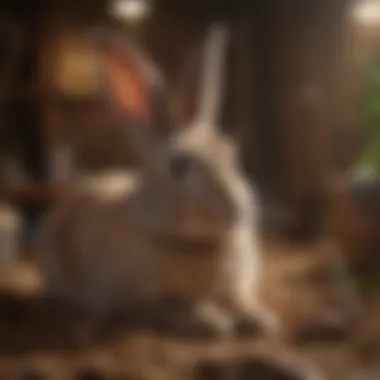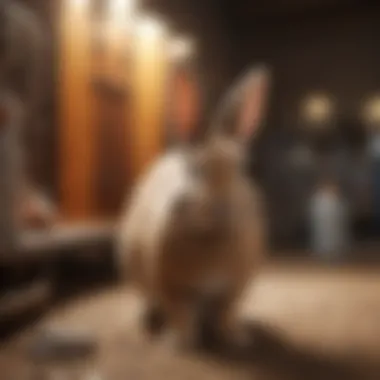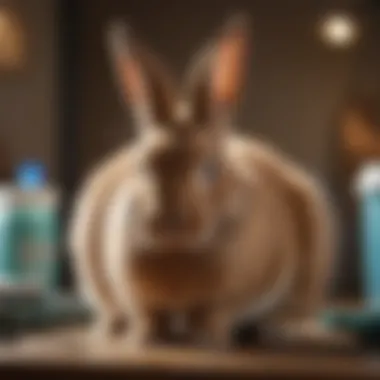Understanding Male Rabbit Neutering: A Detailed Guide


Intro
Neutering male rabbits is an important concern for many pet owners. Understanding the reasons behind neutering and its impact on their health and behavior is critical. This guide will take a closer look at the various aspects of male rabbit neutering. From the necessity of the procedure to the benefits and post-operative care, we will cover all relevant information to help you make informed decisions for your pet.
Understanding Your Pet
Pet Behavior Basics
Male rabbits can display a variety of behaviors. Hormonal influences might lead to aggression, territorial marking, and mounting. Neutering can help to temper these tendencies, promoting a calmer and more manageable demeanor. It is essential for owners to recognize abnormal behaviors as the animal matures.
Common Breed Characteristics
Different breeds of rabbits have unique traits. For example, larger breeds like Flemish Giants may require more space and a specific diet. Smaller breeds such as Holland Lops might exhibit more sociable behaviors. Understanding these characteristics ensures owners can provide tailored care for their pets.
Species-Specific Needs
Rabbits have distinct needs that differ from other pets. They require specific social interactions, a high-fiber diet, and appropriate housing conditions. Knowledge about these needs can enhance overall well-being. Neutering addresses both health and social aspects, allowing the rabbit to integrate better into family life.
Pet Care and Maintenance
Feeding Guidelines
Proper nutrition forms the foundation of a healthy rabbit. A balanced diet includes high-quality hay, fresh vegetables, and limited pellets. Post-neutering, it is essential to monitor food intake to prevent weight gain due to reduced hormonal influences.
Grooming Essentials
Regular grooming is necessary to keep rabbits healthy. This includes combing fur to reduce shedding and prevent matting. Neutered rabbits may require special attention to their coat as hormone levels change, impacting their fur condition.
Hygiene Practices
Maintaining proper hygiene is vital. Regular cleaning of the living environment helps in disease prevention. Additionally, after neutering, watch for any signs of infection at the surgical site and ensure cleanliness during the recovery period.
Training and Development
Basic Commands and Skills
Training rabbits can create a rewarding bond. Start with simple commands such as
Preamble to Male Rabbit Neutering
Neutering male rabbits is a subject that requires careful consideration and understanding. This process does not simply affect the rabbits themselves but extends its impact to pet owners and the environment. It is essential to recognize that neutering is not merely a matter of convenience or preference. Instead, it plays an important role in enhancing the quality of life for the pet, preventing potential health issues, and addressing behavioral problems. Pet owners must be well-informed about what neutering entails and why it can be beneficial.
What is Neutering?
Neutering is a surgical procedure that involves the removal of a male rabbit's testicles. This operation is performed under anesthesia and is done to prevent reproduction. The term


The Procedure of Neutering
The neutering of male rabbits is a critical aspect of responsible pet ownership. Understanding the procedure helps owners prepare adequately for the surgery and support their pets through recovery. This section delves into the various elements of the surgical process, highlighting the need for thorough preparation, outlining the surgical steps, and emphasizing the significance of anesthesia. By understanding what to expect, owners can make informed decisions that promote their pet's well-being.
Preparation for Surgery
Before the surgical procedure can begin, several key preparations are necessary. These steps not only ensure the safety of the rabbit but also facilitate a smooth surgical process. Here are important aspects to consider:
- Pre-Surgical Veterinary Consultation: It is crucial to have thorough discussions with a veterinarian. This appointment allows the vet to examine the rabbit's health status and ensure that it is fit for surgery.
- Fasting Guidelines: Most veterinarians recommend restricting food intake the night before surgery. This helps prevent complications during anesthesia.
- Medical History Review: Owners should provide the vet with a detailed medical history, including any medications the rabbit is currently taking or previous health issues.
Understanding these preparatory steps sets the stage for the surgical experience. It also reassures the owner that they are taking the necessary precautions for their rabbit’s health.
Overview of the Surgical Process
The surgical process for neutering male rabbits generally involves a few straightforward steps. Knowing what to expect during the surgery can ease concerns for both the pet and its owner. Key components of the procedure include:
- Anesthesia Induction: The rabbit will be placed under general anesthesia to ensure it does not feel any pain throughout the procedure.
- Surgical Site Preparation: The area where the surgery will be performed is cleaned and prepared to minimize the risk of infection.
- Incision and Castration: A small incision is made in the scrotum, allowing the veterinarian to remove the testicles.
- Closure: After the testicles are removed, the incision is typically closed with sutures or surgical glue.
The entire procedure often takes less than an hour. It's vital for owners to understand that while the surgery is minor, it is still a procedure that requires careful monitoring and aftercare.
Anesthesia and Its Importance
Anesthesia is an essential component of any surgical procedure. In neutering, it ensures the rabbit is completely relaxed and pain-free during surgery. The effectiveness and safety of anesthesia significantly impact the overall outcome of the procedure. Important points to consider include:
- Types of Anesthesia: Veterinarians may use a combination of injectable and inhaled anesthetics to ensure consistent levels of sedation and pain relief.
- Monitoring During Surgery: The health of the rabbit is continuously monitored throughout the procedure. This includes checking vital signs like heart rate and oxygen levels.
- Post-Anesthesia Recovery: After surgery, rabbits are kept in a quiet environment until they recover fully from anesthesia. Initially, they may be groggy, but they usually bounce back quickly.
This focus on anesthesia underlines its role in minimizing discomfort and ensuring a successful surgery for male rabbits.
Understanding the procedure for neutering male rabbits helps owners lead their pets through the experience with confidence and knowledge, ensuring the process is as smooth as possible.
Benefits of Neutering Male Rabbits
Neutering male rabbits carries several benefits that can significantly enhance their quality of life and overall welfare. This section explains the importance of neutering, particularly focusing on three key areas: behavioral improvements, health benefits, and the impact on overpopulation.
Behavioral Improvements
One of the most noticeable changes following neutering is improved behavior. Unneutered male rabbits often exhibit aggressive tendencies and territorial marking. These behaviors can strain the relationship between the pet and its owner, leading to challenges in household harmony. Neutering can decrease aggression, making the rabbit more sociable within its environment. Without the drive to assert dominance or reproduce, neutered male rabbits are more likely to engage positively with their human companions and other pets.
Health Benefits
Reduction in Reproductive Diseases
Neutering is an effective method to reduce the risk of reproductive-related diseases in male rabbits. Unneutered males are susceptible to various health issues such as testicular cancer and other reproductive disorders. By undergoing this procedure, the chances of these conditions developing are significantly minimized. This aspect is particularly crucial as it directly correlates with the pet's overall health, making neutering a wise choice for long-term wellbeing. The key characteristic here is that it proactively addresses potential health complications before they arise, offering peace of mind for pet owners.
Enhanced Lifespan
Studies suggest that neutered male rabbits tend to have a longer lifespan than their unneutered counterparts. This improvement in lifespan can be attributed to various factors, including a decreased tendency for aggressive behavior and a reduced likelihood of developing certain diseases. Neutering can thus be viewed not merely as a preventive measure but as a significant contributor to longevity. This is a beneficial choice for pet owners who want their rabbits to live long, healthy lives, ensuring many years of companionship. The main feature of enhanced lifespan focuses on promoting a healthier lifestyle, which benefits both the rabbit and its owner.


Impact on Overpopulation
Neutering male rabbits also plays a critical role in addressing pet overpopulation. Millions of rabbits find themselves in shelters annually, many of them unnecessary births from unneutered pets. By neutering, owners can contribute to reducing this issue, promoting more responsible pet ownership. This consideration goes beyond individual owners and touches on the broader societal implications. Therefore, neutering male rabbits is not only a personal decision but also a responsible community action.
Neutering male rabbits not only benefits the pets themselves but also helps alleviate the problem of overpopulation in shelters, promoting a healthier community overall.
Potential Risks and Considerations
When considering neutering a male rabbit, it is essential to understand the potential risks and considerations involved. While neutering offers numerous benefits, both behavioral and health-related, it is not without its drawbacks. Pet owners must weigh these aspects carefully to make informed decisions regarding their pet's welfare.
Common Surgical Risks
Surgery, in general, involves some inherent risks. Neutering male rabbits is a surgical procedure and can carry complications that should not be overlooked. Some common risks include:
- Anesthesia Reactions: Any surgery requiring anesthesia can lead to unexpected reactions. Rabbits are particularly sensitive animals, so a veterinarian should carefully assess their health before surgery.
- Hemorrhage: There is a potential for bleeding during surgery. A skilled veterinarian can minimize this risk by employing proper techniques and having the necessary tools.
- Infection: Post-operative infections can occur, though they are not common. Keeping the surgical site clean and avoiding unnecessary handling can help reduce this risk.
- Delayed Healing: Rabbits can experience slow healing due to their unique physiology. Factors such as age and overall health affect how quickly they recover from surgery.
Long-Term Health Risks
In addition to immediate surgical risks, there are long-term health considerations to keep in mind.
- Hormonal Changes: After neutering, the hormonal profile of a male rabbit will change. Rabbits rely heavily on hormones for various bodily functions. While neutering may reduce certain health risks, it may also impact overall health in unforeseen ways.
- Urinary Tract Issues: Some studies suggest neutered rabbits may be more susceptible to urinary tract problems. This increased risk can stem from hormonal changes affecting bladder control.
- Weight Gain: After neutering, male rabbits can become less active, leading to potential weight gain. Monitor a neutered rabbit's diet to ensure they maintain a healthy weight and lifestyle.
Behavioral Changes Post-Neutering
Neutering can lead to significant behavioral changes in male rabbits. Understanding these changes is crucial for pet owners.
- Reduction in Aggression: Many owners notice a decline in aggressive behaviors post-neutering. This change may foster a more pleasant living environment for both the rabbit and their human companions.
- Less Marking Behavior: Neutered rabbits typically reduce or eliminate urine marking, a common issue among intact males. This change can make living with a rabbit more enjoyable and easier to manage.
- Stronger Bonding: After neutering, many rabbits become more sociable and affectionate. This might result in a deeper bond with their human families.
Neutering, while often beneficial, should be preceded by thorough discussions with a veterinarian to understand all potential risks and management strategies.
Ultimately, the decision to neuter a male rabbit should involve careful consideration of both the potential benefits and the risks. Understanding these factors ensures that pet owners make the best choices for their furry companions.
Post-Operative Care for Neutered Rabbits
Proper post-operative care is essential for male rabbits after neutering. This period can be critical for recovery and impacts both health and wellbeing. Ensuring the best care can facilitate a smoother transition to a post-surgery life. When a rabbit undergoes neutering, it is a significant procedure, and understanding the recovery process can help pet owners provide informed support.
Initial Recovery Period
The initial recovery period usually starts as soon as the rabbit wakes up from anesthesia. During this time, it is crucial to create a calm and quiet environment. Rabbits may feel disoriented or alarmed, so minimizing noise and disturbances can help. It's important to observe the rabbit closely. Ensure it is breathing normally and not displaying excessive agitation or discomfort. This typically lasts for the first 24 to 48 hours.
Here are key considerations for the rabbit's initial recovery:
- Warmth: Keep the recovery area warm, but not too hot. Excessive temperature can stress the rabbit.
- Comfort: Provide clean bedding that is soft and supportive, minimizing stress on the surgical site.
- Hydration: Access to fresh water is essential. Monitor intake to ensure the rabbit is staying hydrated.
- Limited Movement: Restrict jumping or playful activities to avoid disturbing the surgical site.
Signs of Complications
During the recovery, owners must be vigilant for any signs of complications. Recognizing these early can prevent more serious issues. Some common complications post-surgery may include:


- Swelling or redness around the incision site.
- Excessive bleeding, which may require immediate veterinary attention.
- Signs of infection, such as discharge or foul odor from the incision.
- Behavioral changes, like lethargy or refusal to eat or drink.
If any of these signs appear, it is imperative to consult a veterinarian immediately. Early intervention can significantly improve outcomes and ensure recovery proceeds without further difficulties.
Consistent monitoring and immediate attention to any troubling signs can enhance drug recovery and prevent serious complications.
Nutritional Needs Post-Surgery
After the surgery, a rabbit's nutritional needs also change. It is important to provide an appropriate diet during recovery. Following neutering, rabbits may have reduced appetite, so offering favorite foods can stimulate eating. Select options that are easily digestible and gentle on the stomach, such as:
- Fresh hay, which supports digestive health.
- Leafy greens like romaine lettuce or parsley, providing nutrients.
- Small amounts of pellets, ensuring they are formulated for adult rabbits.
Avoid treats that are sugary or fatty, as these can hinder recovery. Ensuring nutritional balance can help with a swift recovery. A rabbit's diet is essential not only for recovery but also for overall health in the long-term post-neutering.
In summary, post-operative care for neutered rabbits is integral to their recovery process. Pet owners should pay close attention to the initial recovery period, keep an eye out for complications, and adjust the diet accordingly. This approach will contribute positively to the rabbits’ wellbeing after the surgical procedure.
Behavioral Management After Neutering
Neutering is a significant event in a male rabbit's life, impacting both their physical health and behavior. Understanding how behavior may change after the procedure is essential for pet owners. Proper behavioral management helps in adapting to these changes, ensuring a harmonious relationship between the pet and its family. Additionally, effective management can prevent unwanted behaviors that may emerge post-surgery.
Understanding Changes in Behavior
After neutering, pet owners can expect several changes in their rabbit's behavior. Most notably, hormone levels will decrease significantly. This can lead to a reduction in aggressive behaviors and territorial marking. Many owners notice that their neutered rabbits become calmer and less prone to fighting with other rabbits.
Furthermore, neutered rabbits may exhibit less hyperactivity and more relaxed interactions with their environment. These changes do not happen overnight. Instead, they occur progressively over several weeks or even months. Owners should be patient and observe their rabbit closely to understand the fluctuations in their behavior.
It is also important to consider that not all behavioral changes are negative. Some rabbits become more social and willing to bond with family members following neutering. However, each rabbit is unique, and individual reactions to the procedure may vary.
Training and Reinforcement
Training remains crucial even after neutering. Positive reinforcement techniques are effective in encouraging good behavior. This method involves rewarding the rabbit for desired actions, which can be accomplished through treats or praise.
Training can focus on several key areas:
- Litter Box Training: Post-neutering, many rabbits are more likely to use a designated area for elimination. Consistent reinforcement encourages this behavior.
- Socialization: Introducing new experiences, while providing positive reinforcement, helps build confidence. It fosters better interactions with humans and other pets.
- Basic Commands: Teaching simple commands or tricks can keep the rabbit mentally stimulated.
Setbacks may occur during the adjustment phase, but patience and consistency are key. Owners should remain positive and supportive throughout this period, ensuring their rabbit feels secure and loved.
Rabbits are sensitive creatures. Building a bond through trust and training is essential in enhancing their well-being.
Ending
In this comprehensive guide, the discussion around neutering male rabbits has established itself as crucial for pet owners. Neutering influences not only individual well-being but also broader societal aspects related to overpopulation. Understanding the methods and implications of this procedure helps owners to make informed choices.
Final Thoughts on Neutering Male Rabbits
Neutering is more than just a surgical process. It carries significant benefits for the health and behavior of male rabbits. Highlighting aspects such as a reduction in aggressive behaviors and the prevention of certain diseases reinforces the reasoning behind this practice. It is essential to approach the topic with care, ensuring that all pre- and post-operative considerations are adequately addressed. Remember, a well-informed pet owner contributes to a healthier, happier environment for their rabbits.
Encouragement for Pet Owners
Pet ownership requires responsibility and commitment. By deciding to neuter, owners take a step toward ensuring a better quality of life for their furry companions. Support from veterinarians and communities can enhance the experience, making the journey smoother. Embrace the knowledge gained from this guide, and consider the positive implications that effective neutering can bring to your household. Neutering is an important action, promoting not only individual rabbit health but also contributing to the overall welfare of the species.
"Understanding the implications of neutering helps improve the bond between you and your pet, making it a win-win decision."







